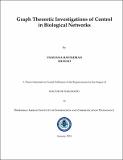Graph theoretic investigations of control in biological networks
| dc.contributor.advisor | Sunitha, V. | |
| dc.contributor.advisor | Bagler, Ganesh | |
| dc.contributor.author | Ravindran, Vandana | |
| dc.date.accessioned | 2018-05-17T08:40:16Z | |
| dc.date.available | 2018-05-17T08:40:16Z | |
| dc.date.issued | 2018 | |
| dc.identifier.citation | Vandana Ravindran(2017).Graph Theoretic Investigations of Control in Biological Networks.Dhirubhai Ambani Institute of Information and Communication Technology.xi, 94 p.(Acc.No: T00680) | |
| dc.identifier.uri | http://drsr.daiict.ac.in//handle/123456789/653 | |
| dc.description.abstract | Biological systems exhibit complex phenomena owing to interconnected molecular mechanisms underlying their architecture. Graph is an ideal mathematical abstraction of such systems. The abstract network along with the dynamics of the system forms a complex network. This thesis focuses on modelling and analysis of biological networks from control systems perspective. We first model the system as a directed network and use the technique of maximum matching to identify driver nodes which help in structurally controlling the system. We investigate the cancer signalling network and propose that identification of specific molecules as drivers of regulatory dynamics is a promising step towards targeted cancer therapies. We also capture the role of driver nodes in the HIV-1-human molecular interactome and show the efficiency with which the virus hijacks the host system for effective pathogenesis. In order to achieve a higher level of understanding of control and its implications in biology, we model five different networks ranging from disease to infection to normal regulation. We find that they are characterized with distributed control and with a large fraction of nodes acting as driver nodes. This implies that such networks are difficult to control. We further investigate the structure of driver nodes in these networks to characterize their control profile. Based on these investigations, we propose that, structural controllability applied to networks can lead to novel understanding of disease mechanisms in a more nuanced way compared to other network analysis. Our work provides a snapshot for control in biological systems assuming that the systems operate under homeostasis. We believe that this approach that amalgamates engineering concepts with biological knowledge can provide better insights into cellular mechanisms of a cell. | |
| dc.publisher | Dhirubhai Ambani Institute of Information and Communication Technology | |
| dc.subject | Control theory | |
| dc.subject | network controllability | |
| dc.subject | driver nodes | |
| dc.subject | biological networks | |
| dc.subject | viral hijack | |
| dc.subject | control mode | |
| dc.subject | control profile | |
| dc.classification.ddc | 006.312 RAV | |
| dc.title | Graph theoretic investigations of control in biological networks | |
| dc.type | Thesis | |
| dc.degree | Ph.D | |
| dc.student.id | 201221013 | |
| dc.accession.number | T00680 |
Files in this item
This item appears in the following Collection(s)
-
PhD Theses [87]

